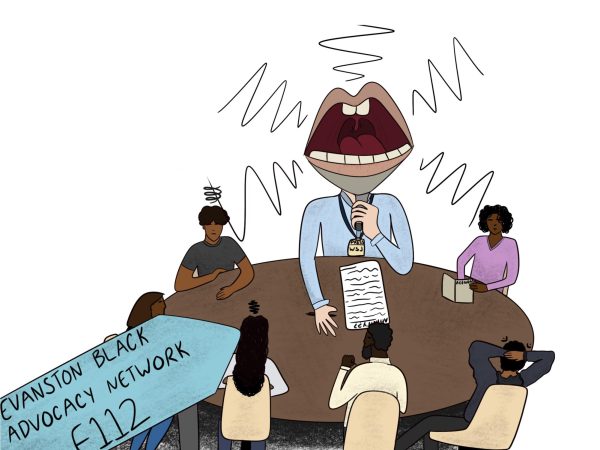Opinion | Evanston must protect young, female employees
Trigger warning: This article references cases of sexual assault and harassment.
In the summer of 2020, over 50 female lifeguards and employees working at Evanston beaches submitted a petition alleging assault and abuse instigated by their male coworkers– mainly supervisors– to city officials.
“For years, women working at the Evanston beaches have been disrespected, taken advantage of, and been made uncomfortable by their fellow staff members,” said the petition, as shared by a WBEZ investigation into the claims. Several signers shared anonymous stories of assault, rape, and mistreatment that they faced while on the job or at events organized by the beachfront staff. In the most egregious example, a 17-year-old alleged that her manager raped her at a party for employees while she was illegally intoxicated.
On Feb. 25 2022, the investigative report created by the law firm Salvatore Prescott Porter & Porter (SPPP) was finalized and released after a year of research into the allegations.
The results: the Evanston city government completely mishandled their chance to address the misconduct. The 379-page report delves deep into the background of the beachfront institution and the eventual fallout of the petition.
While the report is as thorough and well-investigated as the employees deserve, it simply comes too late for generations of employees who had to face these often unnamed and unacknowledged obstacles of unacceptable behavior. SPPP’s findings must prompt real action in the government, so people in power can step up and make concrete changes to the institution that makes it so difficult for sexual assault and abuse of power to be reported and punished.
Sexual harassment prevention needs to be addressed through insitutional programs within workplaces, especially when they are run by City government, when the reasons behind such widespread assault stem from workplace hierarchies. Regular Human Resources departments are simply not enough to adequately assist assault victims and dismantle toxic workplace environments, as shown clearly through the treatment that beach workers faced while attempting to share their own experiences.
SPPP’s report highlights how multiple aspects of workplace culture contributed to and stemmed from what can clearly be identified as toxic behaviors.
The strict hierarchy of command among workers allowed managers to exert power over subordinates with “broad discretion.” This included the right to impose physical punishment, often in the form of forced and/or humiliating exercise.
Furthermore, leadership consisted mainly of men older than the lifeguards; in the summer of 2020, only 33% of beach managers and 30% of lifeguard managers were female. On average, superiors were 3 years older than their subordinates.
Along with these discrepancies in the workplace, employees often attended off-hours parties, where individuals who were both underaged and of-age consumed alcohol and drugs. These gatherings often became settings for harassment, as teenagers were taken advantage of while intoxicated.
Despite overwhelming evidence of a broken system, the officials faced with the task of addressing the misconduct in 2020 fumbled the opportunity greatly.
In 2020, city officials stated in emails later released through the Evanston RoundTable that “the priority right now is getting the City’s budget passed for 2021.” One of the most vocal petitioners, an organizer among the group, said that she “often left meetings [with officials] crying.”
Finally, in October of 2021 (15 months after the initial complaints were reported), the mayor released an apology letter about the untimely response. The apology, while surely needed, does not undo nor excuse the fact that these employees had been mistreated by both their workplace superiors and the officials assigned to protect them.
The reason that these behaviors were not identified earlier is an intentional structure of sexism built into society that normalizes the idea that women must be subordinate in the workplace if they are to succeed. This idea has been intentionally perpetrated through hundreds of years of oppression, and serves to keep our patriarchal society as divided as it is. If women are prevented from succeeding, they will remain oppressed and dependent.
Is it not the sole function of government to secure the rights of every citizen? Is it not a person’s right to be treated with respect and basic human decency? Is it not a person’s right to attend work without fear of being physically, verbally, or sexually assaulted?
By choosing not to take action, Evanston (whether intentionally or not) showed they do not agree with the proposed Equal Rights Amendment that “equality of rights under the law shall not be denied or abridged by the United States or by any State on account of sex.”
The Chicago Park District, after their own harassment and assault scandal around the same time as Evanston’s, decided to fight the problem by diverting $500 million to set up the Office of Protection and Accountability, which aims to “ensure that the Chicago Park District meets its commitment to provide an equitable, inclusive, safe and respectful recreation and work environment free from discrimination, harassment, sexual harassment, sexual misconduct, [and] workplace violence.”
The new office was proposed January 26th, 2022, and is set to introduce a better way to investigate, hold accountable, and generally respond to workplace misconduct such as discrimination, sexual harassment, and abuse. As possibly the most important benefit, the office will offer a set location to report these events once experienced.
Chicago’s actions included releasing the results of a private investigation, the firing of three high-level Park District managers, and the resignation of park board president Avis LaVelle.
There is more to be done than apologies.
Unfortunately, these incidents are not isolated to the lakefront and are experienced by much of Evanston’s young female population. In a survey of 60 ETHS sophomores, 25.6% of female or gender-nonconforming students reported experiencing sexual assault or harassment in a professional setting. 0% of male students answered the same. When asked whether they felt that superiors such as managers or teachers took advantage of their position of power, 60.5% of non-male respondents and 45.5% of male respondents answered yes.
It is not just beaches that need rehabilitation, it is all workplaces operate under outdated views that age and gender cause an employee to deserve less respect.
The park district depends on teenagers for many of its programs, such as summer camps and beachfront management. The city advertises its youth job fairs and opportunities for teens as invaluable experiences. Yet they still fail to protect their most vulnerable workers when it matters most.
Cultures of misogyny and normalized misconduct make any place of work feel unsafe or risky for female employees. Until a proper support system has been established for those affected by gender inequality in the workplace, there will forever be roadblocks preventing women from being able to pursue financial and career success without worries of their personal power being undermined while they do.
By diversifying the identities of those in management positions and giving resources and easily accessible communication lines for those wishing to report mistreatment, the City of Evanston can help dismantle the toxic culture that teen girls face in professional settings.
As individuals, everyone who interacts with and participates in power hierarchies can learn to recognize when they or others are being taken advantage of. It is never shameful to demand to be treated well.
Addressing the issue is the first step, but establishing an office of accountability like Chicago, or appointing a singular authority or team to respond to allegations, could be a next response. Especially after their programs, such as the beaches and summer camps, depend on teenage girls as the majority of their employees, the City of Evanston owes it to its young workers to provide safe, supportive, and positive work environments.
Your donation will support the student journalists of the Evanstonian. We are planning a big trip to the Journalism Educators Association conference in Philadelphia in November 2023, and any support will go towards making that trip a reality. Contributions will appear as a charge from SNOSite. Donations are NOT tax-deductible.







